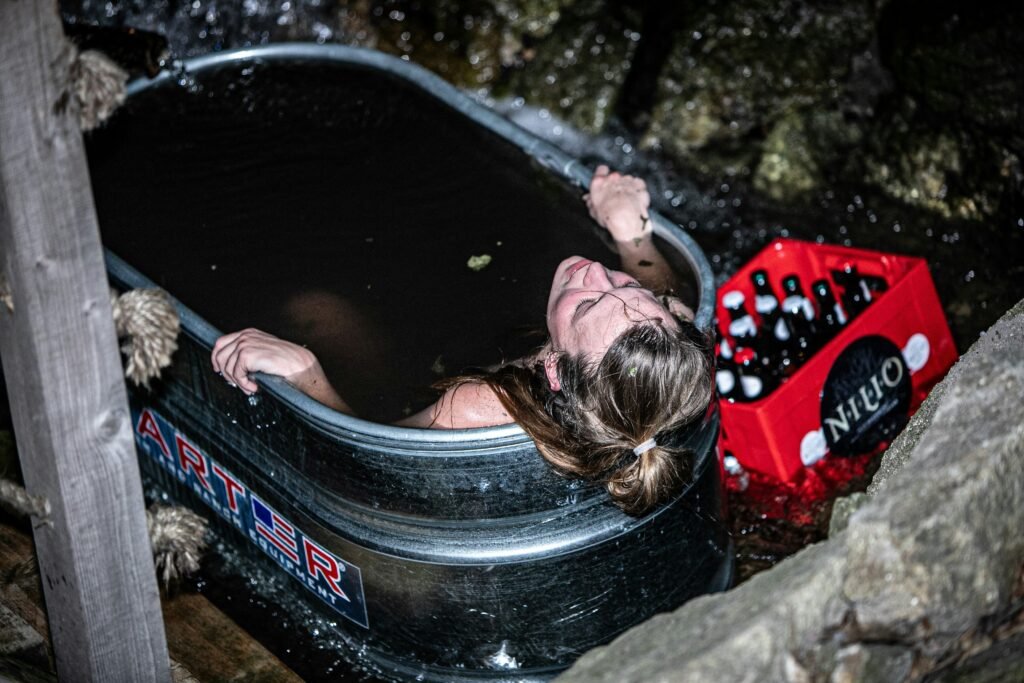Have you ever found yourself in a group cold plunge, shivering and debating whether it’s a good idea to chat with others around you? You might think that chit-chat could lighten the icy experience, but hold on—there’s more to it than just camaraderie. Let’s break down why it might be best to keep the conversation to a minimum during these frosty moments.

The Cold Plunge Experience
A cold plunge involves immersing your body in cold water, typically as part of a recovery regimen or wellness routine. It’s become quite the trend, especially among athletes and wellness enthusiasts. You might find yourself hopping into a tub filled with ice-cold water alongside others, feeling the collective energy in the room. But this experience can be delicate, and talking during a group cold plunge isn’t always what it’s cracked up to be.
Understanding the Benefits of Cold Water Therapy
Before you decide whether to chat or not, let’s explore the benefits of cold water therapy. Immersing yourself in cold water can help with muscle recovery, reduce inflammation, and can even elevate your mood thanks to the release of endorphins. By plunging into cold water, you’re also positively affecting your hormonal balance, boosting your immune system, and increasing circulation. Seems pretty beneficial, right?
The Mental Aspect of Cold Plunges
Beyond the physical benefits lies a crucial mental component to cold plunging. When you immerse yourself in cold water, it’s not just about braving the chill; it’s about building mental resilience. Staying quiet allows you to focus on your breath, quiet your mind, and tune into your body. Engaging in conversation can disrupt this vital connection.
Why Silence Speaks Volumes
You might be wondering how silence can be more beneficial than conversation in this chilly scenario. Silence serves various purposes during a cold plunge, and understanding its role can help you appreciate the experience even more.
Encouraging Mindfulness
When you choose to keep quiet, you open up a space for mindfulness. This practice is all about being present in the moment, allowing you to focus on how your body responds to the cold. You start noticing the sensations, the breath, and even the thoughts pinging in your mind. Acknowledging, rather than distracting yourself with conversation, can deepen the experience.
Promoting Team Unity Through Shared Experience
Shared silence during a cold plunge can foster a sense of unity with those around you. Everyone shares a common goal: to endure the cold and emerge victorious. This shared experience, tied together through silence, strengthens camaraderie in an unspoken way. You’ll find that many others are going through a similar struggle.
Enhancing Personal Reflection
Cold plunges can stir up a multitude of thoughts, emotions, and reflections. These moments of personal introspection can be incredibly powerful. By talking, you risk losing the chance to engage with your true feelings and thoughts, which might be more beneficial than chatting about the weather or the latest Netflix series.
Facilitating Better Breathing Techniques
One of the keys to managing the impact of cold water on your body is breath control. When you talk, your breathing may become irregular or shallow, making it harder to handle the cold plunge. Focusing on your breath in silence allows you to tap into techniques that can ease your discomfort and help you maintain composure.
The Social Dynamic in Group Cold Plunges
Getting together with friends or fellow enthusiasts for a group cold plunge can bring about an exciting social dynamic. But how does talking fit into this setting, and why might you want to think twice before engaging in conversation?
Fostering a Sense of Competition
In a group setting, the pressure to perform can sometimes lead to competition. If you engage in conversation, especially about who can stay in the cold the longest, this can create an atmosphere of one-upmanship. Instead of transforming your experience into a shared adventure, you may find it turning into a contest where ego gets involved.
Recognizing Individual Responses
Every person experiences cold water differently. Some might find it invigorating, while others could be completely overwhelmed. When everyone starts chatting, it may lead to comparisons or judgments about how long someone stays in. Instead, allowing silence can create a safe space for individual responses without the fear of comparison.
Maintaining a Calm Environment
A group cold plunge can be incredibly energizing, but it can also become chaotic if everyone starts talking at once. Silence tends to create a more serene atmosphere, allowing everyone to focus on their own experience without distraction.
The Impact of Group Energy
You might not realize it, but when you enter a shared space, the energy can be infectious. If everyone is shivering in silence, your shared energy works together to demonstrate collective resilience. Engaging in conversation can break this flow, impacting how you and others feel in that moment.
Tips for the Ideal Group Cold Plunge
Let’s take a step back and consider how you can make the most out of a group cold plunge while observing the unspoken rules of silence.
Set an Intent Before Plunging
Before you all plunge into the ice-cold water, take a moment to discuss intentions—without chatter, of course! Whether it’s to recover after a workout or simply to challenge yourselves, setting an intention can ground everyone in a shared purpose while still respecting the silence.
Use Non-Verbal Cues
If you must communicate, think in non-verbal terms. A nod, a thumbs-up, or even simple hand gestures can convey encouragement and acceptance without disrupting the calm that silence provides. A brief smile can say a thousand words.
Focus on Your Breath
The breath is your best friend in cold plunges. Whenever a thought about chatting arises, redirect your focus back to your breath. Noticing the rise and fall of your chest can ground you and create a rhythm that you can share with others in silence.
Establish Boundaries
If you’re hosting the cold plunge, consider setting unspoken ground rules about silence. Let participants know that while camaraderie is welcomed, chatting is best kept to a minimal level. You might be surprised by how everyone feels when the focus shifts back to the experience itself!
Reflect After Plunging
After the cold plunge is over and you’ve all emerged, it’s the perfect time to share experiences and thoughts. Be sure to allow everyone to express themselves after the plunge, so that you can collectively reflect on how it all felt. This way, you’ll benefit from rehashing the experience without diminishing the power of silence during the dive.

The Physical Toll of Cold Plunging
You may think that chatting might make the experience less painful, but the truth often reveals otherwise. Let’s take a closer look at the physical aspect and why it’s essential to stay focused during the cold plunge experience.
The Body’s Reaction to Cold
When submerged in cold water, your body responds to the shock with a variety of physiological changes. This may include increased heart rate, heightened blood circulation, and the tightening of muscles. By remaining silent, you can pay attention to these sensations and learn to manage them more efficiently through focused breathing.
The Chill and Mental Clarity
Ironically, plunging into icy water can lead to increased mental clarity after you emerge. By keeping the experience contained within your own mind—free from chatter—you maximize your chances of experiencing this clearer mindset. By refraining from conversation, you allow yourself to focus on how the cold both challenges and teaches you.
Recovery and Long-Term Benefits
The true goal of a cold plunge is recovery. Speaking can shift your attention from the real purpose of the plunge. If you absorb all the physical benefits aimed at soothing sore muscles and improving overall health, that’s an investment worth keeping silent for.
Tuning Into Your Environment
Every cold plunge is unique, especially in a group setting. Tuning into the environment around you can significantly enhance your experience. Here’s how silence plays a vital role in connecting with your surroundings.
Listening to the Sounds of Water
When you’re quiet, you might start to notice the subtle sounds of water splashing and freezing temperatures surrounding you. Hearing the water’s movement can create a calming backdrop that deepens your immersion in the experience. This connection to your environment is often lost in conversation.
Observing Your Fellow Plungers
In silence, you’ll have the chance to observe the reactions and expressions of those around you. Instead of focusing on what you might say next, you can see how others handle the plunge, which can inform your own experience and even lead to an unspoken bond of resilience between plungers.
The Value of Nature
If your group cold plunge occurs outdoors, consider tuning in to the natural elements around you. Birds, rustling leaves, or the rush of wind can heighten your awareness and connection to nature. Silence grants you the ability to absorb the beauty of your surroundings fully.

Conclusion: Embracing Silence During a Group Cold Plunge
Surrendering to silence during a group cold plunge can amplify your experience in more ways than you might expect. By focusing on mindfulness, encouraging camaraderie without conversation, and appreciating your surroundings, you’re opening up a wealth of personal insight and growth.
As you gear up for your next cold plunge, remember that sometimes, less is indeed more. Embrace the cold, relish the silence, and let the experience speak for itself. After all, in those chilling moments, the whispers of resilience can be more powerful than any words exchanged.

